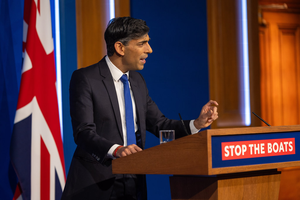As Chancellor, Sunak was not convinced of Rwanda plan’s effectiveness: Report
During his tenure as the British Chancellor Prime Minister Rishi Sunak had doubts whether the government’s scheme of sending migrants to Rwanda would stop channel crossings, documents seen by the BBC suggest.
According to No 10 papers from March 2022, Sunak was not convinced of the plan’s effectiveness, which was launched in April 2022 by then Prime Minister Boris Johnson.
In addition, he was also concerned about the cost of sending asylum seekers to Africa and wanted to limit the numbers, The Evening Standard reported, citing the BBC.
The then Chancellor felt “hotels are cheaper” than reception centres to house migrants, and was reluctant to fund “Greek-style reception centres” at a cost of 3.5 million pounds per day, the documents revealed.
But when he became the Prime Minister in 2022, the Rwanda Bill became the core of his policy to stop the boats — one of five key priorities, which Sunak set out to achieve.
Under the plan, anyone who arrived in Britain illegally after January 1, 2022, faced being sent to Rwanda, some 6,400 km away. In a big setback to his government last year, the UK’s Supreme Court rejected plans to send migrants to Rwanda as unlawful as it would put them at risk.
Stating that the ruling “was not the outcome we wanted”, Sunak said that his “commitment to stopping the boats is unwavering”.
Shadow Home Secretary Yvette Cooper told the BBC that as a Chancellor, Sunak resisted the plan as he knew it was incredibly costly and wouldn’t work.
“But he is so weak he has now agreed to write cheques to Rwanda for 400 million pounds without sending a single person there in a desperate attempt to shore up his leadership,” Cooper said.
The revelations by the documents come as Sunak grapples with a new crisis after a Conservative MP pledged to stand down “as soon as possible” over a new legislation.
The announcement from former Energy Minister Chris Skidmore means the Conservatives will have to defend two seats which could easily swing to Labour in upcoming by-elections.

